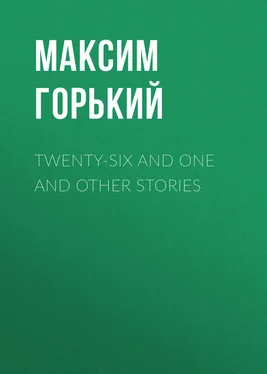Максим Горький - Twenty-six and One and Other Stories
Здесь есть возможность читать онлайн «Максим Горький - Twenty-six and One and Other Stories» — ознакомительный отрывок электронной книги совершенно бесплатно, а после прочтения отрывка купить полную версию. В некоторых случаях можно слушать аудио, скачать через торрент в формате fb2 и присутствует краткое содержание. Жанр: Русская классическая проза, Классическая проза, на английском языке. Описание произведения, (предисловие) а так же отзывы посетителей доступны на портале библиотеки ЛибКат.
- Название:Twenty-six and One and Other Stories
- Автор:
- Жанр:
- Год:неизвестен
- ISBN:нет данных
- Рейтинг книги:3 / 5. Голосов: 1
-
Избранное:Добавить в избранное
- Отзывы:
-
Ваша оценка:
- 60
- 1
- 2
- 3
- 4
- 5
Twenty-six and One and Other Stories: краткое содержание, описание и аннотация
Предлагаем к чтению аннотацию, описание, краткое содержание или предисловие (зависит от того, что написал сам автор книги «Twenty-six and One and Other Stories»). Если вы не нашли необходимую информацию о книге — напишите в комментариях, мы постараемся отыскать её.
Twenty-six and One and Other Stories — читать онлайн ознакомительный отрывок
Ниже представлен текст книги, разбитый по страницам. Система сохранения места последней прочитанной страницы, позволяет с удобством читать онлайн бесплатно книгу «Twenty-six and One and Other Stories», без необходимости каждый раз заново искать на чём Вы остановились. Поставьте закладку, и сможете в любой момент перейти на страницу, на которой закончили чтение.
Интервал:
Закладка:
He sat on the bench, strong and clean and jovial; talking and laughing all the time. We were silent. Somehow or other he seemed repulsive to us this time.
"How lucky I am with women, Eh? It is very funny! Just a wink and I have them!"
His white hands, covered with glossy hair, were lifted and thrown back to his knees with a loud noise. And he stared at us with such a pleasantly surprised look, as though he really could not understand why he was so lucky in his affairs with women. His stout, red face was radiant with happiness and self-satisfaction, and he kept on licking his lips with relish.
Our baker scraped the shovel firmly and angrily against the hearth of the oven and suddenly said, sarcastically:
"You need no great strength to fell little fir-trees, but try to throw down a pine.".
"That is, do you refer to me?" asked the soldier.
"To you.."
"What is it?"
"Nothing… Too late!"
"No, wait! What's the matter? Which pine?"
Our baker did not reply, quickly working with his shovel at the oven. He would throw into the oven the biscuits from the boiling kettle, would take out the ready ones and throw them noisily to the floor, to the boys who put them on bast strings. It looked as though he had forgotten all about the soldier and his conversation with him. But suddenly the soldier became very restless. He rose to his feet and walking up to the oven, risked striking his chest against the handle of the shovel, which was convulsively trembling in the air.
"No, you tell me – who is she? You have insulted me… I?.. Not a single one can wrench herself from me, never! And you say to me such offensive words.".. And, indeed, he looked really offended. Evidently there was nothing for which he might respect himself, except for his ability to lead women astray; it may be that aside from this ability there was no life in him, and only this ability permitted him to feel himself a living man.
There are people to whom the best and dearest thing in life is some kind of a disease of either the body or the soul. They make much of it during all their lives and live by it only; suffering from it, they are nourished by it, they always complain of it to others and thus attract the attention of their neighbors. By this they gain people's compassion for themselves, and aside from this they have nothing. Take away this disease from them, cure them, and they are rendered most unfortunate, because they thus lose their sole means of living, they then become empty. Sometimes a man's life is so poor that he is involuntarily compelled to prize his defect and live by it. It may frankly be said that people are often depraved out of mere weariness. The soldier felt insulted, and besetting our baker, roared:
"Tell me – who is it?"
"Shall I tell you?" the baker suddenly turned to him.
"Well?"
"Do you know Tanya?"
"Well?"
"Well, try.".
"I?"
"You!"
"Her? That's easy enough!"
"We'll see!"
"You'll see! Ha, ha!"
"She'll.."
"A month's time!"
"What a boaster you are, soldier!"
"Two weeks! I'll show you! Who is it? Tanya! Tfoo!".
"Get away, I say."
"Get away… you're bragging!"
"Two weeks, that's all!"
Suddenly our baker became enraged, and he raised the shovel against the soldier. The soldier stepped back, surprised, kept silent for awhile, and, saying ominously, in a low voice: "Very well, then!" he left us.
During the dispute we were all silent, interested in the result. But when the soldier went out, a loud, animated talk and noise was started among us.
Some one cried to the baker:
"You contrived a bad thing, Pavel!"
"Work!" replied the baker, enraged.
We felt that the soldier was touched to the quick and that a danger was threatening Tanya. We felt this, and at the same time we were seized with a burning, pleasant curiosity – what will happen? Will she resist the soldier? And almost all of us cried out with confidence:
"Tanya? She will resist! You cannot take her with bare hands!"
We were very desirous of testing the strength of our godling; we persistently proved to one another that our godling was a strong godling, and that Tanya would come out the victor in this combat. Then, finally, it appeared to us that we did not provoke the soldier enough, that he might forget about the dispute, and that we ought to irritate his self-love the more. Since that day we began to live a particular, intensely nervous life – a life we had never lived before. We argued with one another all day long, as if we had grown wiser. We spoke more and better. It seemed to us that we were playing a game with the devil, with Tanya as the stake on our side. And when we had learned from the bulochniks that the soldier began to court "our Tanya," we felt so dreadfully good and were so absorbed in our curiosity that we did not even notice that the proprietor, availing himself of our excitement, added to our work fourteen poods (a pood is a weight of forty Russian pounds) of dough a day. We did not even get tired of working. Tanya's name did not leave our lips all day long. And each morning we expected her with especial impatience. Sometimes we imagined that she might come to us – and that she would be no longer the same Tanya, but another one.
However, we told her nothing about the dispute. We asked her no questions and treated her as kindly as before. But something new and foreign to our former feelings for Tanya crept in stealthily into our relation toward her, and this new something was keen curiosity, sharp and cold like a steel knife.
"Fellows! Time is up to-day!" said the baker one morning, commencing to work.
We knew this well without his calling our attention to it, but we gave a start, nevertheless.
"Watch her!.. She'll come soon!" suggested the baker. Some one exclaimed regretfully: "What can we see?"
And again a lively, noisy dispute ensued. To-day we were to learn at last how far pure and inaccessible to filth was the urn wherein we had placed all that was best in us. This morning we felt for the first time that we were really playing a big game, that this test of our godling's purity might destroy our idol. We had been told all these days that the soldier was following Tanya obstinately, but for some reason or other none of us asked how she treated him. And she kept on coming to us regularly every morning for biscuits and was the same as before. This day, too, we soon heard her voice:
"Little prisoners! I've come.."
We hastened to let her in, and when she entered we met her, against our habit, in silence. Staring at her fixedly, we did not know what to say to her, what to ask her; and as we stood before her we formed a dark, silent crowd. She was evidently surprised at our unusual reception, and suddenly we noticed that she turned pale, became restless, began to bustle about and asked in a choking voice:
"Why are you.. such?
"And you?" asked the baker sternly, without taking his eyes off the girl.
"What's the matter with me?"
"Nothing.."
"Well, quicker, give me biscuits.."
She had never before hurried us on..
"There's plenty of time!" said the baker, his eyes fixed, on her face.
Then she suddenly turned around and disappeared behind the door.
The baker took up his shovel and said calmly, turning towards the oven:
"It is done, it seems!.. The soldier!.. Rascal!.
Scoundrel!".
Like a herd of sheep, pushing one another, we walked back to the table, seated ourselves in silence and began to work slowly. Soon some one said:
"And perhaps not yet.".
"Go on! Talk about it!" cried the baker.
We all knew that he was a clever man, cleverer than any of us, and we understood by his words that he was firmly convinced of the soldier's victory… We were sad and uneasy. At twelve o'clock, during the dinner hour, the soldier came. He was, as usual, clean and smart, and, as usual, looked straight into our eyes. We felt awkward to look at him.
Читать дальшеИнтервал:
Закладка:
Похожие книги на «Twenty-six and One and Other Stories»
Представляем Вашему вниманию похожие книги на «Twenty-six and One and Other Stories» списком для выбора. Мы отобрали схожую по названию и смыслу литературу в надежде предоставить читателям больше вариантов отыскать новые, интересные, ещё непрочитанные произведения.
Обсуждение, отзывы о книге «Twenty-six and One and Other Stories» и просто собственные мнения читателей. Оставьте ваши комментарии, напишите, что Вы думаете о произведении, его смысле или главных героях. Укажите что конкретно понравилось, а что нет, и почему Вы так считаете.












